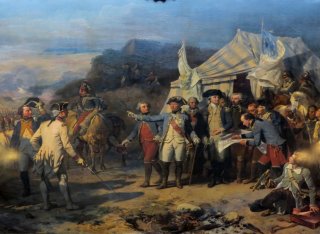The Christmas Song That May Have Been Played After the Battle of Yorktown
Was "The World Turned Upside Down" among the various tunes that were played during the British surrender ceremony?
A popular legend is that following the Battle of Yorktown, on October 19, 1781, during the official surrender ceremonies, a group of British Army bandsmen—which may have consisted of little more than a few pipes and drums—had started to play an American or French tune in tribute to the victors. However, General George Washington seemed to refuse such honors of war, and insisted that they play a "British or German march."
Thus, the British played the English ballad "The World Turned Upside Down."
For British Commander, Lord Charles Cornwallis, who actually wasn't present at the ceremony, the world had certainly been turned upside down. The seemingly greatest military power in the world had been defeated by the upstart colonials!
Whether the tune was, in fact, played on October 19, 1781, however, has remained in doubt.
There were actually several tunes known by the name, and at least one of them was popular in the era of the American Revolution. Yet, it wasn't until the 1828 edition of Garden's Anecdotes of the Revolution that the song was first mentioned to have been played, along with other tunes, at the ceremony.
Pomp and Circumstance
The customs of the eigteenth century were such that a vanquished army would march out and lay down their arms, while the band—if present—would play a march from the victor's national book of martial melodies. The American Revolution was a conflict that often saw many traditional conventions broken, and surrender ceremonies were just one aspect.
One factor to consider is that for much of the conflict, the British Army didn't actually see the American Continental Army as a truly honorable foe. The American forces relied on militia, utilized unorthodox tactics, and even continued the war after its capital of Philadelphia had been captured. The fact that it was a colonial uprising, a rebellion in the truest sense, also meant that many of the niceties of war were all but dispensed with.
After the capitulation of Charlestown, South Carolina, on May 13, 1780, the victorious British commander, General Sir Henry Clinton, had denied the honors of war to the American commander, General Benjamin Lincoln of Massachusetts. That included requiring the American forces to keep their colors (flags) cased and forbidding them from playing an English or German tune.
General Washington subsequently denied similar traditions to the British following their surrender after Yorktown.
What Tunes Were Played?
The surrender at Yorktown was no small affair. At least 3,500 of the 7,247 British and German soldiers at Yorktown were healthy enough to take part in the surrender parade, where they slowly marched out to stack their arms. There would have certainly been time for more than a single tune to have been heard.
The British may have had upwards of 137 fifers and drummers, who would have played a variety of marches that afternoon. Additionally, there were reports that American and French bands also attended the ceremony, but little has been recorded as to whether they took part musically.
This brings us to the question: was "The World Turned Upside Down" among the various tunes that were played during the British surrender ceremony?
Possibly not, given that it was actually about Christmas!
The song was written in response to another battle from English history—namely Oliver Cromwell's victory at the Battle of Naseby in 1645, and what it meant for the traditional observance and merrymaking of the Christmas holiday. Prior to the Commonwealth under Cromwell, Christmas had become something of a bawdy and boisterous affair that included lots of feasts, singing, and of course drinking.
The lyrics of the tune were essentially a protest to the end of the merriment:
Holy-days are despis'd,
New fashions are devis'd.
Old Christmas is kickt out of Town.
Yet let's be content, and the times lament,
You see the world turn'd upside down.
Thus, if the song was in fact played, then it could be argued that a Christmas song was played by the vanquished at Yorktown.
However, that's not quite the end of the story.
Whether the British Army would play such a song less than four decades after that rebellion to honor another rebellious force seems dubious—yet there are sources that suggest the song was in fact played following the British Army's retreat from Salem, Massachusetts in 1775.
Finally, for those soldiers at Yorktown, the world had turned upside down, and perhaps they had hopes that King George III would enjoy his own again.
Peter Suciu is a Michigan-based writer who has contributed to more than four dozen magazines, newspapers and websites. He regularly writes about military small arms, and is the author of several books on military headgear including A Gallery of Military Headdress, which is available on Amazon.com.

